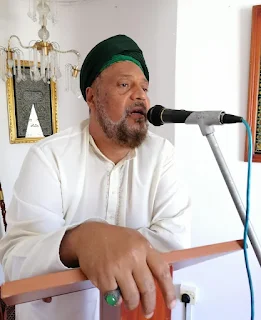 ‘Hold fast to God’s rope all together; do not split into factions. Remember God’s favour to you: you were enemies and then He brought your hearts together and you became brothers by His grace; you were about to fall into a pit of Fire and He saved you from it– in this way God makes His revelations clear to you so that you may be rightly guided. Be a community that calls for what is good, urges what is right, and forbids what is wrong: those who do this are the successful ones. Do not be like those who, after they have been given clear revelation, split into factions and fall into disputes: a terrible punishment awaits such people.’ [3:104-106)
‘Hold fast to God’s rope all together; do not split into factions. Remember God’s favour to you: you were enemies and then He brought your hearts together and you became brothers by His grace; you were about to fall into a pit of Fire and He saved you from it– in this way God makes His revelations clear to you so that you may be rightly guided. Be a community that calls for what is good, urges what is right, and forbids what is wrong: those who do this are the successful ones. Do not be like those who, after they have been given clear revelation, split into factions and fall into disputes: a terrible punishment awaits such people.’ [3:104-106)
Elects of
God appear to call people to the Right Path- providing them with true and clear guidance to discriminate between good and
the bad; reforming their communities through Divinely-gifted
teachings; laying solid foundations for great nations by unifying
hearts in Divine worship and urging adherence to the higher values of life. It is
those sublime teachings established by the Prophets through their noble personal examples that constitute the Rope of Allah for their nations to cherish and act upon in all their lives. Hence, Holy Prophet
Muhammad (sa) left behind a treasure-trove of eminently-sensible, behavioural principles and practical
guidance in the form of the Holy Qur’an and the sacred traditions of Holy
Practices for the Muslims to hold on for all times. If only people follow the teachings of God in the way in which they are expected to be followed: it would benefit the
believers in their individual and social lives, and would also profit
them in the world to come, Insha Allah.
When
Prophets leave this world, their spiritual successors are elected by the
assembly of the Pious to carry on and establish the heavy tasks of Faith in all
its divine sanctity and purity. And then comes a time in the life of the
community- especially when error and deviance impact people’s lives in
profoundly negative ways- when Allah (swt) in His infinite wisdom raises His
Elect in the community to repeat the cycle of spiritual renewal once again. Islamic history bear witness to this grand Divine principle and established practice. After the death of the Holy Prophet (sa), the Muslim Ummah witnessed the presence
of righteous Caliphs in the early days, and also, in later centuries, the advent of a series of Mujaddidin who appeared to guide and rejuvenate Islam at times of difficult
fortunes for the Ummah. In our own
times, to renew the original teachings of the Prophet (sa), Allah (swt) has raised a
Muhyiuddin, a Khalifatullah, a Mujaddid,
a Mahdi, a Dhul Qarnayn in our midst. Indeed, with all the aforesaid spiritual titles and more, the Divine Manifestation in
the person of Hazrat Munir Ahmad Azim Saheb (aba) of Mauritius is here to
revive and restore sublime Faith in the Prophetic Path as an enduring, living,
thriving Highway to God. It is by recognizing and following such pure servants of God that believers can cling to the Rope of Allah in this era, and access felicity and
progress in both the worlds.






